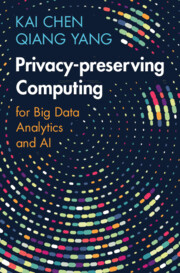 Privacy-preserving Computing for Big Data Analytics and AI, by Kai Chen and Qiang Yang, is a rather short 2024 CUP book translated from the 2022 Chinese version (by the authors). It covers secret sharing, homomorphic encryption, oblivious transfer, garbled circuit, differential privacy, trusted execution environment, federated learning, privacy-preserving computing platforms, and case studies. The style is survey-like, meaning it often is too light for my liking, with too many lists of versions and extensions, and more importantly lacking in detail to rely (solely) on it for a course. At several times standing closer to a Wikipedia level introduction to a topic. For instance, the chapter on homomorphic encryption [Chap.5] does not connect with the (presumably narrow) picture I have of this method. And the chapter on differential privacy [Chap.6] does not get much further than Laplace and Gaussian randomization, as in eg the stochastic gradient perturbation of Abadi et al. (2016) the privacy requirement is hardly discussed. The chapter on federated leaning [Chap.8] is longer if not much more detailed, being based on a entire book on Federated learning whose Qiang Yang is the primary author. (With all figures in that chapter being reproduced from said book.) The next chapter [Chap.9] describes to some extent several computing platforms that can be used for privacy purposes, such as FATE, CryptDB, MesaTEE, Conclave, and PrivPy, while the final one goes through case studies from different areas, but without enough depth to be truly formative for neophyte readers and students. Overall, too light for my liking.
Privacy-preserving Computing for Big Data Analytics and AI, by Kai Chen and Qiang Yang, is a rather short 2024 CUP book translated from the 2022 Chinese version (by the authors). It covers secret sharing, homomorphic encryption, oblivious transfer, garbled circuit, differential privacy, trusted execution environment, federated learning, privacy-preserving computing platforms, and case studies. The style is survey-like, meaning it often is too light for my liking, with too many lists of versions and extensions, and more importantly lacking in detail to rely (solely) on it for a course. At several times standing closer to a Wikipedia level introduction to a topic. For instance, the chapter on homomorphic encryption [Chap.5] does not connect with the (presumably narrow) picture I have of this method. And the chapter on differential privacy [Chap.6] does not get much further than Laplace and Gaussian randomization, as in eg the stochastic gradient perturbation of Abadi et al. (2016) the privacy requirement is hardly discussed. The chapter on federated leaning [Chap.8] is longer if not much more detailed, being based on a entire book on Federated learning whose Qiang Yang is the primary author. (With all figures in that chapter being reproduced from said book.) The next chapter [Chap.9] describes to some extent several computing platforms that can be used for privacy purposes, such as FATE, CryptDB, MesaTEE, Conclave, and PrivPy, while the final one goes through case studies from different areas, but without enough depth to be truly formative for neophyte readers and students. Overall, too light for my liking.
[Disclaimer about potential self-plagiarism: this post or an edited version will eventually appear in my Books Review section in CHANCE.]




 “We are interested in the question of how we can build differentially-private algorithms
“We are interested in the question of how we can build differentially-private algorithms